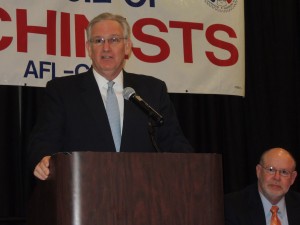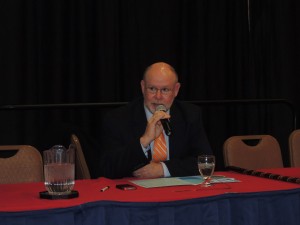
– Labor Tribune photo
By TIM ROWDEN
Associate Editor
Jefferson City – At a time when the labor community is facing the greatest threats they’ve faced in over a generation, there is hope, Hugh McVey, president of the Missouri AFL-CIO, told union leaders here last month but it will take work.
“We can do this, but we can’t do it without your support,” McVey told roughly 250 union delegates and activists at the Missouri AFL-CIO’s Joint Legislative Conference, labor’s biggest conference of the year at the State Capitol March 24-27. “Your support and unity is what keeps the labor movement moving. It’s the workers. It’s people that belong to the labor movement.”
The Missouri General Assembly ramped up its war on labor last month with the Missouri House and Senate passing paycheck deception bills and the Missouri House passing its second anti-prevailing wage measure prior to the spring recess.
Passage of the anti-union, anti-worker measures raises the stakes for unions as the General Assembly heads into the second half of this session.
“We are under attack like we’ve never been before,” Missouri AFL-CIO Secretary Treasurer Mike Louis said. “They’re out to do away with us, to beat us down, to have us all working for minimum wage. That’s their agenda. That’s what they want to do to us.”
Last week’s conference, which stretched over three days, included a major speech by Democratic Gov. Jay Nixon that touched on prevailing wage, right-to-work (for less) and the need for Medicaid expansion.
The conference was organized by the Machinists, Steelworkers, CWA, UAW, UFCW and IBEW, and attended by representatives of those unions as well as the Gasworkers, American Federation of Teachers (AFT) and UniteHere.
After getting a briefing at the conference, the unions sent their delegates to the State Capitol to speak with their hometown legislators.
Some of the delegates also participated in a rally of public sector workers on the last day of the conference on the steps of the Capitol.
‘THE TOUGHEST WE’VE EVER HAD’
It was Nixon’s speech, in which he referenced the political climate on the eve of the Civil War and the 1911 Triangle Shirtwaist Factory fire – in which 146 garment workers, most of them immigrant women, died when a fire broke out in the 10-storey building in which they were working – that set the tone for the conference.
“While we want to say today’s politics are the toughest we’ve ever had, they pale in comparison,” Nixon said, noting that the galvanization of working people since 1911 had given us the minimum wage, child labor laws, a 40-hour workweek, overtime pay, health insurance, sick leave, workplace safety standards, unemployment insurance, and workers’ compensation.
“We stand on the shoulders of some titans,” Nixon said. “Our responsibilities remain the same. Our issues may be a little different, but we are not entitled to complain or whine about how tough our task is. We have been given a lot. It is now our job to make sure that what we have earned, and what has been earned by countless generations before us, is not taken away from us by the whims of a short little political storm that will end. The pendulum will swing back.”
Until it does, Nixon said, it’s important to work across party lines in the Republican-dominated legislature.
“It’s important that your friends – on both sides of the aisle – know how much you appreciate them, and that they stand by you through thick and thin and back up their words with actions.”
PREVAILING WAGE
Enforcement of prevailing wage laws has increased dramatically since Nixon took office, resulting in $5.7 million in back pay for misclassified workers.
In 2008, Nixon said, there were only 180 cases involving misclassified workers. Since 2009, he said, there have been 26,000 cases.
“We took the reigns off (the Department of Labor) and let them do their job,” Nixon said.
Currently, the prevailing wage for a given trade is based on voluntary surveys submitted by contractors in each county.
Two measures recently passed out of the House would change that in certain areas. One (HB 409) would change the calculation in rural areas to an average weekly statewide wage compiled by the state Labor Department. The other (HB 34) would exempt construction and maintenance work done for certain school districts from the prevailing wage rate requirement upon the school board’s approval.
RTW (FOR LESS)
On right-to-work (for less), Nixon said: “The people of Missouri spoke loud and clear when they rejected right-to-work in 1978.”
Although supporters deceptively call them “freedom to work,” the nearly half-a-dozen right-to-work (for less) measures under consideration in the Missouri Legislature are designed to weaken unions financially and inject government into contract negotiations by forcing union members to support non-union freeloaders, allowing them to get the benefits of the union contract without paying their fair share of the cost.
“It hasn’t worked in other areas where folks have tried to use it as an economic development tool,” Nixon said. “All that is is a narrow agenda. That’s not going to move our state forward.”
Although Nixon opposes a right-to-work (for less) law, lawmakers could avoid his opposition because two of the measures currently under consideration – House Bill 77, sponsored by Rep. Eric Burlison (R-Springfield), and House Bill 91, sponsored by Rep. Donna Lichtenegger (R-Cape Girardeau) – would be submitted to voters instead of the governor.

“Organized labor needs to stand united,” McVey said. “The fact of the matter is, right-to-work may be on the ballot in 2014. They think Missouri is going to be the 25th right-to-work state, (following Michigan and Indiana) but they better be sure, because I want to make sure this is where the bleeding stops, right here in Missouri. The bleeding stops at the Arch.”
MEDICAID EXPANSION
Nixon closed by asking the delegates to lobby their legislators in favor of expanding Medicaid to provide healthcare for 300,000 uninsured Missourians, creating 24,000 new jobs next year alone.
Under the Affordable Care Act, the federal government will pay 100 percent of the cost of Medicaid expansion – or $1.8 billion – for calendar years 2014, 2015, and 2016 and at-least 90 percent of the funding thereafter.
For Missouri to get the funding, the General Assembly must pass a bill to authorize it be the end of this session.
“Strengthening Medicaid will help hundreds of thousands of working Missourians get basic health coverage,” Nixon said. “These are not people who aren’t trying, or hoping to game the system. They’re folks we see every day. They’re family members, friends, some holding down two jobs just to make ends meet and feed their families.”

